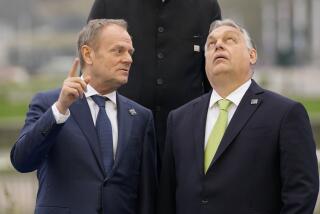U.S. Stake in East Bloc Is Limited
- Share via
There is a specter haunting Eastern Europe. It is the specter of freedom. In Hungary and Poland democratic forces are pushing aside repressive Communist regimes. Other East European countries are under increasing pressure to liberalize.
Americans have a humanitarian interest in greater freedom for Eastern Europe. The strengthening of democratic rights is a fundamental goal of American foreign policy. And greater freedom in the Eastern Bloc serves America’s interest in ending the Cold War and promoting a unified, democratic Europe.
While our diplomatic stake in Eastern European liberalization is enormous, our economic stake is limited. The whole of the Eastern Bloc, including the Soviet Union, accounts for only about 4% of world trade, and the lion’s share of this trade is with Western Europe. Even a doubling of Eastern imports from the United States would increase U.S. exports by less than 1%, and more than half of this increase would come from the Soviet Union alone.
For the citizens of Poland and Hungary, economic and political discontent are of equal urgency. Both countries face economic crises. They must compress domestic living standards, already woefully low, to repay huge Western loans. At the same time, they must embark on massive reform and investment efforts to improve the efficiency of their industries.
The economic situation in Poland is particularly grim. Inflation is raging at an annual rate of more than 100%, and meat and other basic products are almost unobtainable except on the black market at exorbitant prices. In both countries, unemployment--non-existent in socialist economies until recently--is increasing.
Difficult to Achieve
Hungary and Poland are looking to the United States, Western Europe and Japan for economic support to ease their transition to democracy. They want more capital--mainly through debt relief and joint ventures with Western companies--and larger Western markets for their exports.
There are formidable barriers to achieving these objectives. A dramatic expansion of Hungarian or Polish exports to Western markets is extremely unlikely in the short run. After decades of inefficient investment and poor quality control, not many Eastern products can compete with their Western counterparts. Nor is it likely that either Hungary or Poland will get much of the capital infusion that they hope for. Poland alone wants $10 billion of its debt rescheduled over the next three years. Foreign banks, especially the large European and Japanese banks that already have lent heavily to both countries, are more interested in the repayment of old loans than in extending new ones.
Nor are the East Europeans likely to attract much private capital from Western firms, despite recent relaxation of their joint venture laws. Hungary and Poland have relatively little to offer foreign investors--their labor costs are high compared to those in other parts of the world, their internal markets are sluggish, their technologies are outmoded and their political future is cloudy.
Moreover, they are not part of the European Community, whose plan for a unified market by 1992 has attracted a flood of foreign investment. Poland and Hungary can only look on with envy as foreign investors shower money on Spain and Portugal, members of the European Community offering low labor costs, vigorous domestic markets and political stability.
Debt Relief Needed
Even if Hungary and Poland succeed in mobilizing significant financial support, it may buy little more than short-term relief. As the Polish experience of the 1970s demonstrates, the mere presence of foreign capital, unallied to successful economic reform, will not improve economic performance in the long run.
Under these circumstances, what economic measures should the U.S. government take to encourage democracy in Poland and Hungary?
First, the United States should cooperate with its Western allies to develop support programs. Meaningful debt relief must be part of these programs. As the United States is finally coming to realize after witnessing nearly a decade of depression and growing political instability in Latin America, heavily indebted nations cannot rebuild their economies while shipping massive amounts of capital back to their creditors.
Poland should be included in Treasury Secretary Nicholas F. Brady’s plan for debt rescheduling. Debt relief for Eastern Europe, however, should be a predominantly European initiative--European banks are more heavily exposed than American banks, and the European countries have the greatest economic stake in Eastern Europe’s revival. When reckoning its financial commitment to Eastern Europe, the United States must be mindful that a dollar of support for Eastern Europe may be one dollar less for Latin America, where our economic and political interests are much more pressing.
Second, support programs for Poland and Hungary should be linked to meaningful economic reform whenever possible. President Bush’s proposal for a fund to promote private sector development in Poland is an example of such linkage. Western leaders, however, must recognize that economic reform is a painfully slow, easily reversible process, with significant negative side effects in the form of unemployment, income inequity and inflation. Not even the International Monetary Fund and the World Bank, with their vast experience in promoting economic development around the world, have managed to design a quick-fix reform program for socialist economies. There simply isn’t any.
Encourage Trade Pacts
Western nations also should relax discriminatory export and import controls on trade with the East. Hungary, like Poland and other members of the General Agreement on Tariffs and Trade, should be granted “most favored nation” status on a permanent basis. And the United States should encourage the European Community to negotiate bilateral trade agreements that facilitate Polish and Hungarian integration into the unified European market.
While easing discriminatory barriers to commercial relations with Eastern Europe, the United States should not actively subsidize such relations. Although there are both commercial and diplomatic benefits from expanded trade and investment with Eastern Europe, there is no reason to use preferential policies to promote them. Private decisions to trade or invest in Eastern European countries should be commercially, not politically, motivated.
Finally, both Western governments and Western businesses must recognize that there is no simple link between economic and political reform. The Chinese experience since 1978 vividly demonstrates that dramatic economic change can occur without greater democracy. Ironically, political liberalization in Eastern Europe may actually impede economic reform. It will be difficult for newly elected democratic leaders to convince their populations that they ought to accept even greater economic hardship today as a necessary prelude to future prosperity. They have chased such will-o-the-wisps before.
More to Read
Sign up for Essential California
The most important California stories and recommendations in your inbox every morning.
You may occasionally receive promotional content from the Los Angeles Times.













